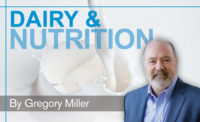New research supports benefits of milk and other dairy foods for Black Americans
Nutritious dairy diet can break down health disparities.

Photo courtesy of LightFieldStudios / iStock / Getty Images Plus

One of the largest opportunities in the United States is amplifying the role of healthy eating patterns in achieving health equity and nutrition security. This is not a new issue but it is receiving more attention because of the continued rise in health disparities and diet-related chronic diseases, especially among people of color.
The U.S. Census Bureau projects that people of color will make up 56% of the U.S. population by 2060, indicating a tremendous opportunity to reduce health disparities and support a healthier country in the future.
Diet is a modifiable factor that can improve health disparities. While science supports the important role of dairy foods in healthy eating patterns, there’s a perception that milk is not culturally appropriate. This presents a challenge for the dairy community and also for many people of color who are already at a disadvantage and could benefit from the nutrition dairy foods deliver.
Education on how dairy foods can be part of culturally relevant diets is core to shifting perceptions and gaining trust. National Dairy Council (NDC) and other members of the dairy community address barriers, disinformation, and misperceptions, such as on lactose intolerance, and are working with trusted third-party health organizations to help inform, provide solutions, and balance the discussion.
New research published in the Journal of the National Medical Association (NMA) offers credible, scientific support for dairy foods’ benefits to the nutrition and health of Black Americans. NMA is the largest and oldest national organization representing Black American physicians and their patients, and they are a leading the way in the elimination of disparities in health.
The research, titled “The role of dairy food intake for improving health among Black Americans across the life continuum,” includes seven papers and an editorial offering evidence-based recommendations to guide physicians in their patient education on dairy foods and health. NDC provided an unrestricted research grant, but no checkoff input or influence was included.
This new research is similar to the Dietary Guidelines for Americans in that it assesses the role of dairy consumption on health outcomes for different life stages and ages from pregnancy to healthy aging.
The report’s authors state that avoiding dairy foods because of misinformation or incorrect self-diagnosis of lactose intolerance “may put Black populations at higher risk for inadequate intake of multiple micronutrients and several preventable diseases.” Strategies to address lactose intolerance include seeking accessible options such as lactose-free and fermented dairy foods or taking probiotic or enzymatic supplements.
The authors also address the nutritional quality of plant-based alternatives, stating intake of these products instead of dairy “may carry serious health risks, especially for pediatric populations, pregnant and lactating women, geriatric populations, and populations such as Black Americans with chronically low intake of dairy nutrients, including calcium and vitamin D.”
It is critical to elevate and reinforce the evidence on healthy eating patterns and the role of dairy foods in reducing health disparities and achieving health equity for all people. The endorsement of the NMA to increase consumption of dairy foods to recommended levels to help reduce risk of diet-related diseases that disproportionately affect Black Americans is significant.
Looking for a reprint of this article?
From high-res PDFs to custom plaques, order your copy today!







